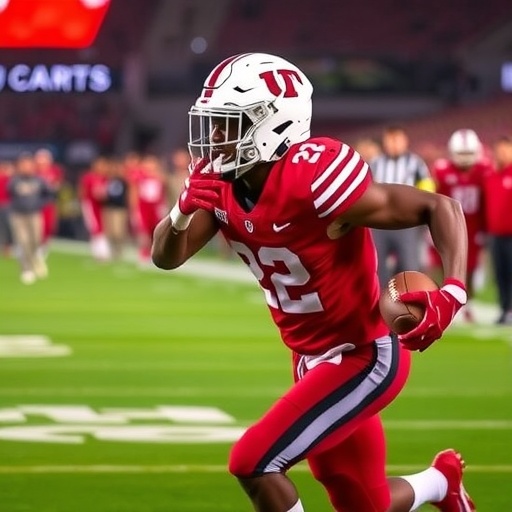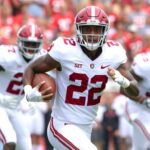Freshman Phenom Byrd Ficklin Shines as Utah Crushes Deion Sanders’ Colorado 53-7 in College Football Blowout
In a stunning display of offensive firepower and defensive dominance, true freshman quarterback Byrd Ficklin made his mark on college football history, orchestrating Utah‘s 53-7 demolition of Colorado on Saturday night at Rice-Eccles Stadium. The 18-year-old phenom from Salt Lake City threw for 312 yards and four touchdowns in his first career start, silencing doubters and propelling the No. 12 Utes to a decisive victory over Deion Sanders’ rebuilding Buffaloes.
- Ficklin’s Electric Debut: Four TDs and Zero Turnovers Propel Utes Offense
- Deion Sanders’ Buffaloes Crumble: Defensive Woes and Offensive Stagnation Exposed
- Utah’s Defensive Masterclass: Sacks, Turnovers Force Colorado into Submission
- Rivalry Rekindled: Historic Implications of Utah’s Commanding Victory
The game, part of the intense Rocky Mountain rivalry, highlighted the stark contrast between Utah‘s disciplined execution and Colorado’s ongoing struggles under Sanders’ high-profile regime. With the scoreline evoking memories of past Utes’ routs, Ficklin’s poise under pressure became the story of the night, as he connected on 22 of 28 passes without a single interception. This win not only boosts Utah’s Big 12 standing but also reignites conversations about the program’s national championship aspirations.
Ficklin’s Electric Debut: Four TDs and Zero Turnovers Propel Utes Offense
Byrd Ficklin entered the game as an unproven commodity, a highly touted recruit who had seen limited action in mop-up duty earlier in the season. But against Colorado’s porous secondary, the freshman wasted no time asserting himself. On his first drive, Ficklin marched the Utes 75 yards in just six plays, capping it with a 28-yard strike to wide receiver Dorian Singer for the game’s opening score. “It felt like everything clicked,” Ficklin said post-game, his voice steady despite the adrenaline. “Coach Whittingham prepared us for every scenario, and my teammates made the tough catches.”
Throughout the first half, Ficklin’s accuracy was surgical. He completed 15 of 18 passes for 210 yards and three touchdowns before halftime alone, spreading the ball to seven different receivers. His arm strength shone on a 45-yard bomb to tight end Brant Kuithe in the second quarter, which put Utah up 21-0. Statistically, Ficklin’s performance drew comparisons to past Utah greats like Tyler Huntley, who led the Utes to a Rose Bowl victory. Advanced metrics from ESPN’s college football analytics showed Ficklin posting a 95.2 passer rating, the highest by a freshman starter in a Big 12 game this season.
The ground game complemented Ficklin’s aerial assault perfectly. Running back Micah Bernard rushed for 142 yards and two scores on 18 carries, including a 32-yard scamper that exploited Colorado’s overpursuing linebackers. Utah’s offense amassed 478 total yards, averaging 7.4 yards per play—a figure that underscores the efficiency under offensive coordinator Andy Ludwig. Ficklin’s ability to evade pressure, scrambling for 28 yards on designed runs, added an improvisational element that kept the Buffaloes’ defense guessing.
Interviews with teammates revealed the freshman’s quiet confidence. “Byrd’s been our scout team star all fall,” Singer noted. “We knew he had it in him. This is just the beginning for him in college football.” As the Utes’ depth chart evolves with injuries to veteran QBs, Ficklin’s debut positions him as a frontrunner for more starts, potentially altering Utah’s trajectory in the conference race.
Deion Sanders’ Buffaloes Crumble: Defensive Woes and Offensive Stagnation Exposed
For Deion Sanders, the Prime Time coach brought to Boulder with visions of swagger and star power, the 53-7 loss to Utah served as a harsh reality check. Colorado’s defense, which entered the game ranked 112th nationally in points allowed, surrendered 478 yards—the most in Sanders’ tenure. The Buffaloes’ secondary, featuring transfers like safety Shilo Sanders (Deion’s son), was repeatedly torched, allowing Utah to convert 8 of 12 third downs.
Offensively, Colorado managed just 187 total yards, with quarterback Shedeur Sanders throwing for 189 yards but under constant duress from Utah’s front seven. The younger Sanders was sacked four times and fumbled twice, both leading to Utes’ scores. “We didn’t execute when it mattered,” Deion Sanders admitted in his post-game presser, his signature flair tempered by frustration. “Utah is a machine; we gotta get back to basics.” This marked Colorado’s third loss in four games, dropping them to 3-4 overall and 1-2 in Big 12 play.
The Buffaloes’ running game, a point of emphasis under Sanders’ spread scheme, faltered miserably. Travis Hunter, the two-way star and Heisman contender, was limited to 34 receiving yards before a late-game ankle tweak sidelined him. Colorado’s 7 points came on a fluke 65-yard punt return touchdown by Nikko Reed in the third quarter, but it was too little, too late. Analysts pointed to poor tackling—Utah broke 12 tackles for big gains—and miscommunications in coverage as key culprits.
In the broader context of college football, this defeat amplifies scrutiny on Sanders’ roster overhaul. Since his 2023 arrival, Colorado has invested heavily in the transfer portal, landing 27 newcomers this offseason. Yet, cohesion remains an issue, with penalties totaling 112 yards against Utah. “Prime’s building something special, but tonight showed the growing pains,” said ESPN’s Rece Davis during halftime analysis. For Buffaloes fans, the loss rekindles painful memories of the program’s 1-11 debacle in 2022, just before Sanders’ arrival.
Utah’s Defensive Masterclass: Sacks, Turnovers Force Colorado into Submission
Utah’s defense, under coordinator Morgan Scalley, was the unsung hero of the rout, holding Colorado to under 3 yards per rush and intercepting Shedeur Sanders once in the fourth quarter. Linebacker Lander Barton led the charge with 11 tackles and two sacks, disrupting the Buffaloes’ rhythm from the snap. The Utes’ 4-0 turnover margin—two forced fumbles and an interception—directly resulted in 17 points, showcasing their opportunistic play style.
Key stops included a goal-line stand in the second quarter, where defensive end Junior Tafuna stuffed a Colorado fourth-down sneak, preserving a 28-0 lead. Utah’s pass rush generated five sacks total, with edge rusher Van Fillinger contributing 1.5. Statistically, the Utes ranked top-20 nationally in sacks per game entering the matchup, and they lived up to that billing. “Our D-line set the tone,” Scalley said. “They attacked like wolves, and it freed up the secondary to make plays.”
The secondary, anchored by cornerbacks Zemaiah Vaughn and Tao Johnson, blanketed Colorado’s receivers, limiting Hunter to a season-low in production. Utah forced three three-and-outs in the first half alone, flipping field position and giving Ficklin short fields to exploit. This performance boosts Utah’s defensive EPA (Expected Points Added) ranking to No. 8 in the Big 12, a critical factor as they face tougher opponents like USC and Washington ahead.
In a rivalry game steeped in history—Utah leads the all-time series 33-31-3—this defensive effort evoked the gritty units that powered the Utes’ 2004 and 2008 undefeated seasons. Fans chanted “Utes! Utes!” throughout, turning Rice-Eccles into a cauldron of energy that intimidated the visiting Buffaloes.
Rivalry Rekindled: Historic Implications of Utah’s Commanding Victory
The Utah-Colorado matchup, once a staple of the Mountain West Conference, carries extra weight in the Big 12 era. This 46-point thrashing is Utah’s largest margin over Colorado since a 55-0 win in 2011, underscoring the Utes’ resurgence under head coach Kyle Whittingham. Whittingham, now in his 20th season, improved to 5-1 against Sanders’ teams, including a 2023 comeback win in Boulder.
Post-game, Whittingham praised his team’s preparation: “We schemed for their speed, and our guys executed flawlessly. Byrd stepping up like that? It’s special.” The victory improves Utah to 6-1 overall and 3-1 in conference, keeping them in the hunt for a Big 12 title game berth. Attendance of 51,000-plus created an electric atmosphere, with tailgates buzzing about Ficklin’s potential Heisman buzz—premature, perhaps, but his debut certainly turned heads.
For Colorado, the loss intensifies pressure on Sanders to stabilize the program. With high-profile recruits watching, including five-star prospects visiting Boulder next weekend, the Buffaloes must rebound quickly against Arizona State. Sanders’ motivational style—famous for “Prime Time” speeches—will be tested, as team morale dips after such a public setback.
Looking ahead, Utah’s schedule toughens with road games at UCLA and Oregon State, where Ficklin’s experience will be invaluable. If the freshman maintains this level, the Utes could emerge as dark horses for the College Football Playoff, especially with a favorable late-season slate. Colorado, meanwhile, faces a must-win stretch to salvage bowl eligibility, highlighting the divergent paths in this Rocky Mountain showdown.
As college football’s regular season hits its stride, Ficklin’s emergence adds a compelling narrative to Utah’s championship pursuit, while Sanders’ Buffaloes grapple with foundational challenges. The 53-7 scoreline isn’t just a result—it’s a statement on preparation, talent, and the relentless grind of the sport.








